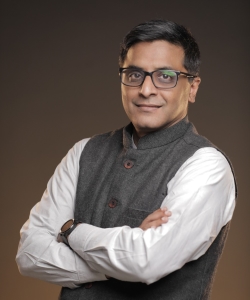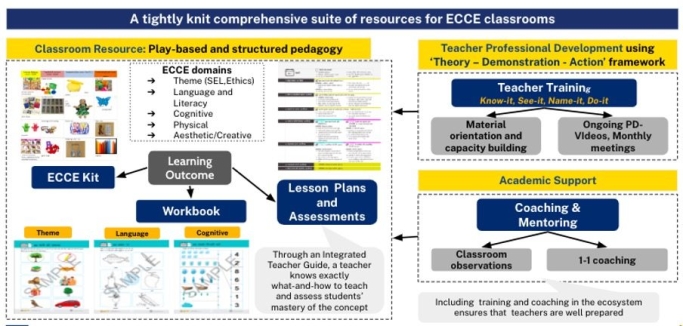 Go Back
Go BackShare
Early Childhood Education for Better Learning Foundations – In Conversation with Anustup Nayak
By Anustup Nayak and CSF
Jul 17, 2024
NEP 2020’s visionary emphasis on three years of pre-primary education in India is a timely policy push to ensure our three year olds start the right learning journey. At CSF, we recognise ECE as step zero of FLN. In this article, we hear from Anustup Nayak on the ECE landscape in India, challenges in ECE classrooms and CSF’s approach to ensuring quality ECE for children, while achieving a sustainable FLN-ECE continuum in the country.

Project Director – Early Childhood Education, CSF
Q1. What are some key elements of quality Early Childhood Education ( ECE) and what challenges is India facing in this space?
Early childhood education spans the first six years of a child’s life and focuses on their cognitive, language, literacy, socio-emotional, physical, creative and cultural development. It plays a pivotal role as step zero in advancing foundational literacy and numeracy (FLN) for children. Evidence from neuroscience, developmental economics and education suggests that quality ECE improves outcomes for schooling, future earnings and a better society.
In India, government-run ECE programmes are delivered through 14 lakh Anganwadis and pre-primary sections are available in a small fraction of primary schools. Unfortunately, ECE outcomes in India are poor. The ASER 2019 report suggests that only 25% of five-year-olds could complete a simple listening comprehension task based on an easy-to-relate four-sentence story in the local language and nearly a one-third of five-year-olds were able to count objects, a pre-numeracy task.
Systemic constraints such as budgets, prioritisation and dedicated teachers impact ECE provisioning in India. Despite recognition from the NEP 2020, ECE budgets grow weak at a mere 10% of primary education spending. Additionally, only 20% of government schools offer pre-primary and 8% of these pre-primary sections have dedicated ECE teachers.
Across both government schools and Anganwadis, the most neglected cohort remains the five-to-six-year old age group. With the new enrolment guidelines for Grade 1 entry stipulating that 6-year-olds should enrol in Grade 1, five-year-olds will get left out of the government system and instead enrol in private schools/preschools. Five- to six-year-olds need to be readied for Grade 1, which requires greater focus on pre-numeracy, pre-literacy and socio-emotional skills. However, Anganwadis lack the prioritisation and skill to deliver school readiness for them. Additionally, primary schools lack the infrastructure and resources to accommodate these children.
Q2. What systemic and programmatic shifts can enable our curriculums and schools to achieve a sustainable ECE-FLN continuum in India?
To revolutionise ECE in India, the government must increase funding for ECE (currently at 10% of funding for primary education levels), recruit dedicated ECE teachers and expand ECE offerings to all government schools. There is a need to overhaul the curriculum with play-focused materials, implement frequent teacher training with structured pedagogy tools and establish robust classroom observation and mentoring systems.
To ensure our five- to six-year-olds are ready for school, we recommend the introduction of Balvatikas (pre-primary grades) in all government schools, ensuring play-based learning, aligned with the Foundational Literacy and Numeracy (FLN) programme in states. This requires three key enablers:
- Staffing of Balvatikas with trained ECE teachers
- Ensuring full enrolment of five-year-olds in Balvatikas through central and state budget allocations
- Alignment of pre-primary materials with the National Curriculum Framework (NCF) and National Council of Educational Research and Training (NCERT) guidelines
These shifts are crucial in bridging gaps in the Indian ECE landscape, providing a strong foundation for lifelong learning. To further sustain these shifts, continuous monitoring and evaluation are key.
Q3. What are some key milestones and contributions in CSF’s journey in early childhood education?
CSF recently conducted a research study, titled ‘Building Strong Foundations: Examining Early Childhood Education in India, across seven states (Assam, Andhra Pradesh, Madhya Pradesh, Maharashtra, Punjab, Telangana and Uttar Pradesh), to identify challenges and opportunities for ECE in the country. The study identified systemic and programmatic challenges in ECE delivery, examining curriculum, teaching practices, teacher capacity, parental involvement and monitoring mechanisms in 220 classrooms.
In 2023-24, CSF played a strategic role in Uttar Pradesh’s (UP) ECE reforms. We supported in structuring the ECE budgets, securing funds for dedicated educators and extended instructional support (materials and training) to Anganwadis in the state. We contributed to the ECE curriculum development, training of mentor cadres, monitoring and strengthening governance for the ECE programmes. CSF also supported the state in developing a 12-week school readiness programme with teacher guides and workbooks in January 2023. The programme was implemented across 18 districts in co-located Anganwadis between February-April 2024. We piloted this curriculum in 50 Anganwadis in Aligarh, doubling learning time from 20 to 40 minutes on average.
Q4. Time spent on ECE activities and effective learning time for children are prominent challenges in an ECE classroom in India. How, in your opinion, can this be solved?
These challenges stand true for ECE in India. A recent study, titled ‘Building Strong Foundations: Examining Early Childhood Education in India’, by Central Square Foundation (CSF), revealed:
- ECE classrooms average only 38 minutes of daily activities, falling far short of recommended hours
- Over 50% of activities last less than 10 minutes, limiting student engagement and skill development
Increased education budgets allow states to innovate in educator recruitment, supported by evidence from successful initiatives in Tamil Nadu and Uttar Pradesh. Early evidence from a CSF-supported pilot in UP (Aligarh district) highlights that effective teaching time increases when teachers are supported with the following:
- Classroom resources including structured pedagogy guides and student workbooks among other teaching and learning materials (TLM)
- Practice-oriented teacher training and ongoing continuous teacher professional development through monthly teacher meetings, short instructional videos, courses, etc.
- Classroom observations, followed by mentoring and coaching support

Q5. What is CSF’s approach to ensuring quality early childhood education in India?
At CSF, we are deeply committed to ensuring quality early learning for all children. We see ECE as the foundation for ensuring all children achieve FLN by the age of eight years. As a new entrant to the ECE ecosystem in India, our efforts aim to catalyse innovation in the existing system and scale evidence-based solutions for pre-primary education.
CSF’s ECE work focuses on three priorities:
- Support states in implementing quality Balvatika programmes: we provide technical and project management support to states across six workstreams including setting up of new Balvatikas, developing curriculum materials and assessments, training and continuous professional development, monitoring and mentoring, governance and reviews and community engagement. We also work with districts to ensure faithful implementation of state-designed programmes and accelerate the achievement of school-readiness outcomes.
- Generate insights and evidence on effective ECE: through district interventions, we conduct academic and governance pilots to improve teaching effectiveness and ensure data-driven reviews for ECE. We measure the process and impact of interventions on school-readiness outcomes through rigorous evaluation studies.
- Promote quality ECE and enable progressive reforms nationally: we engage with central institutions on critical areas for establishing Balvatikas and build awareness for quality ECE by leveraging media and other key communication channels.
About Anustup Nayak
Anustup leads the Early Childhood Education and Classroom Instruction and Practices (CIP) team at CSF. In his role, he works with CSF partner organisations and state government agencies to support the implementation of the FLN mission.
Prior to working at CSF, his work involved supporting and scaling up an entrepreneurial venture named XSEED Education. He is passionate about equipping teachers with the right tools and skills to succeed in the classroom.
He holds a Master’s degree in education from Harvard Graduate School of Education and Public Policy at Georgia Tech.
Keywords
Authored by
Anustup Nayak
Project Director - Early Childhood Education, Central Square Foundation
CSF
Central Square Foundation
Share this on
